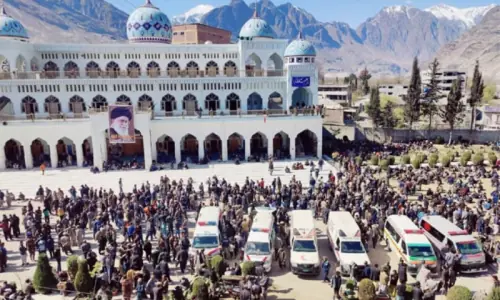RAWALPINDI: The Environmental Protection Agency-Punjab (Punjab-EPA) has approved the 720 megawatt (MW) Karot Hydropower Project worth $1.4 billion.
The project is proposed to be built on the Jhelum River near village Karot in Kahuta tehsil in Rawalpindi district. The proposed project site is 65 kilometres from Rawalpindi city.
The hydropower project would be developed privately by a Chinese company and would be transferred to the government after 30 years of operation, according to the Power Generation Policy 2002. The project will be connected to the national electricity grid in the year 2020.
Know more: Incentive for speedy construction of hydropower projects sought
“The Punjab-EPA, in Rawalpindi, approved the project after receiving the Environmental Impact Assessment (EIA) report. The report has now been sent to Lahore for final approval. The Punjab-EPA director general will soon announce the date for the public hearing of the project,” District Officer Mian Muhammad Nawaz told Dawn.
He said the Rawalpindi-EPA recommended that the private company developing the project ensure that there are green spaces around the project site. “The project is likely to improve agriculture in this arid area, rather than having a negative impact,” he said.
In November 1984, the Water and Power Development Authority (Wapda) carried out ranking studies and identified possible sites for the development of hydropower plants along the Jhelum River. The site at Karot was among those identified as potential sites for hydropower generation. The ranking studies were carried out by Wapda’s Hydro Electric Power Organisation for NWFP province (now Khyber Pakhtunkhwa) and German consultancy firm GTZ.
However, since the identification of the site, no further development took place until 2007 when the site was offered as an Investment Power Project (IPP) by the Private Power Infrastructure Board (PPIB).
Plant expected to contribute 720MW of electricity to the national grid by 2020
A group of Pakistani and Chinese investors were awarded the contract for the development of the hydropower generation plant. A feasibility report was prepared in March 2014, which suggested that the main axis of the dam should be downstream and it should be a rock-fill type dam.
Commissioner Zahid Saeed told Dawn the project required 2,400 kanals in Kahuta tehsil in the Rawalpindi district and would also require some land in Azad Jammu and Kashmir (AJK) as Kahuta borders AJK.
The commissioner said the Punjab government has decided that land procurement would be the investor’s responsibility.
“The Chinese investor would start procuring land soon and the government will provide assistance to the company. However, the government would be involved in negotiations over prices of land and this would be decided between the landowners and the company,” he said.
Published in Dawn March 2nd , 2015
On a mobile phone? Get the Dawn Mobile App: Apple Store | Google Play

































